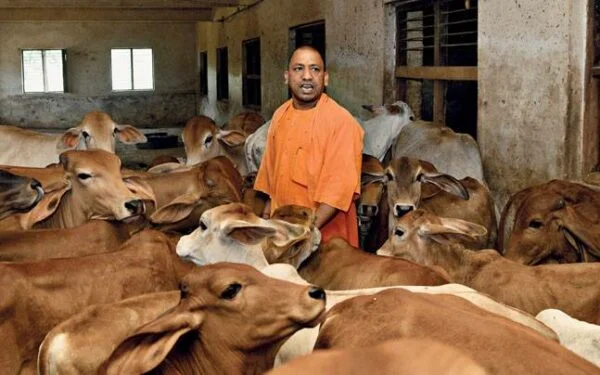By A Representative
In a unique protest move, the Socialist Kisan Sabha (SKS), an Uttar Pradesh based farmers’ rights group, has decided has decided that on January 26, 2021, when the farmers will be entering Delhi on tractors, its cadres will show solidarity support by taking stray cattle to chief minister Yogi Adityanath’s residence to take care of them.
In a statement, SKS said, they the organisation has decided to begin its cattle march from Fatehpur Chaurasi block of Unnao district and reach Yogi’s residence on the Republic Day. The cattle will be tied outside so that the chief minister should take care of them, said SKS president Anil Kumar Mishra.
The statement, also signed by Munnalal Shukla, spokesperson, Socialist Party (India), UP, and Magsaysay award winning social activist Sandeep Pandey, also national vice president of the party, said, “Villagers in Uttar Pradesh are fed up of stray cattle. These animals graze crops standing in fields. The cow sheds which have been started by the government are non-functional.”
It added, “There is no arrangement to feed them. As a result they again start roaming around freely. The government does not even have funds to transport the cows from villages to cow sheds. If people want to volunteer to undertake this task, BJP workers come in the way. Cow protector in a BJP government is one who doesn’t look after the cows but indulges in hooliganism in the name of cow.”
Recalling an incident, the statement said, “On December 27, 2021 when villagers from Lalamau Mawai of Hardoi district, who had walked all the way to a cow shed 15 km away from the their village escorting 28 cows on the direction of veterinary officer and after informing the police, were returning with the cows after the villagers of Pawayan Bhagwantapur refused to keep the cows in a cow shed located in their village, a BJP office bearer Gyanendra Singh from Lohangapur village assaulted the villagers.”
It added, “He and his goons continued beating the villagers of Lalmau Mawai even after he was made to talk to the police and police informed him that they were aware of the movement of cattle. The Hardoi police has refused to register a case against Gyanendra Singh, primarily because of his association with the ruling party. Among the people who got beaten, include five Dalits.”
In a unique protest move, the Socialist Kisan Sabha (SKS), an Uttar Pradesh based farmers’ rights group, has decided has decided that on January 26, 2021, when the farmers will be entering Delhi on tractors, its cadres will show solidarity support by taking stray cattle to chief minister Yogi Adityanath’s residence to take care of them.
In a statement, SKS said, they the organisation has decided to begin its cattle march from Fatehpur Chaurasi block of Unnao district and reach Yogi’s residence on the Republic Day. The cattle will be tied outside so that the chief minister should take care of them, said SKS president Anil Kumar Mishra.
The statement, also signed by Munnalal Shukla, spokesperson, Socialist Party (India), UP, and Magsaysay award winning social activist Sandeep Pandey, also national vice president of the party, said, “Villagers in Uttar Pradesh are fed up of stray cattle. These animals graze crops standing in fields. The cow sheds which have been started by the government are non-functional.”
It added, “There is no arrangement to feed them. As a result they again start roaming around freely. The government does not even have funds to transport the cows from villages to cow sheds. If people want to volunteer to undertake this task, BJP workers come in the way. Cow protector in a BJP government is one who doesn’t look after the cows but indulges in hooliganism in the name of cow.”
Recalling an incident, the statement said, “On December 27, 2021 when villagers from Lalamau Mawai of Hardoi district, who had walked all the way to a cow shed 15 km away from the their village escorting 28 cows on the direction of veterinary officer and after informing the police, were returning with the cows after the villagers of Pawayan Bhagwantapur refused to keep the cows in a cow shed located in their village, a BJP office bearer Gyanendra Singh from Lohangapur village assaulted the villagers.”
It added, “He and his goons continued beating the villagers of Lalmau Mawai even after he was made to talk to the police and police informed him that they were aware of the movement of cattle. The Hardoi police has refused to register a case against Gyanendra Singh, primarily because of his association with the ruling party. Among the people who got beaten, include five Dalits.”


Comments